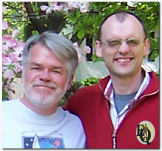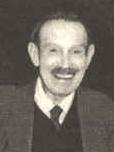Tuesday, October 28: Mystery Masterclass
Melodie’s taking yet ANOTHER week off, but this time it’s because we’ve got this wonderful piece by Dale Andrews, who won 2nd place in the Ellery Queen Readers’ Choice Awards this year. —JLW
THE PASTICHE
by Dale C. Andrews
I attended my first Bouchercon this year, and had the pleasure (and privilege) of tagging along on several of the extra-curricular activities planned in advance by James and attended by the contributing authors at Criminal Brief. At the first of these, a great dinner at a small Baltimore restaurant that James had uncovered during an email exchange with Laura Lippman, James caught my eye and informed me that it was high time for me to get busy and contribute something of my own.
 Most excuses for not writing boil down to one word: procrastination. But having said this, it is still a little presumptuous for me to jump in here. I have published exactly one short story: “The Book Case,” written with the help of Kurt Sercu (on the right) who is webmaster of “Ellery Queen – a Website of Deduction.” As an aside, if you haven’t checked out Kurt’s website, I urge you to do so. One can be lost for hours wandering through the incredible information Kurt has assembled about Ellery Queen, and about Manfred Lee and Frederic Dannay, hiding behind the mask.
Most excuses for not writing boil down to one word: procrastination. But having said this, it is still a little presumptuous for me to jump in here. I have published exactly one short story: “The Book Case,” written with the help of Kurt Sercu (on the right) who is webmaster of “Ellery Queen – a Website of Deduction.” As an aside, if you haven’t checked out Kurt’s website, I urge you to do so. One can be lost for hours wandering through the incredible information Kurt has assembled about Ellery Queen, and about Manfred Lee and Frederic Dannay, hiding behind the mask.
“The Book Case,” as some of you may know, is a pastiche. It brings back Ellery Queen as a 102 year-old detective, called upon to solve one last mystery – the strange murder of a Manhattan psychiatrist who died surrounded by first editions of every Ellery Queen mystery. I have a second story that will appear in the next few months in Ellery Queen Mystery Magazine. That story, “The Mad Hatter’s Riddle,” is yet another pastiche, this time involving Ellery as a consultant to the 1975 NBC series “Ellery Queen.”
Since we are always warned as writers that we should “write what we know,” the obvious theme for me to explore here is the theme that runs through my meager (so far) bibliography: the pastiche.
If you Google “pastiche” looking for a definition, the first one you will find is this: “a work of art that intentionally imitates other works, often to ridicule or satire.” As seems true of a lot of internet research, I would say that definition is “close, but no cigar.” You might guess, if you have been following this, that the definition I will offer up instead is one penned originally by Frederic Dannay, writing as Ellery Queen. Dannay wrote that “a pastiche is a serious and sincere imitation in the exact manner of the original author.” The readily apparent difference between the two definitions is that the former includes the parody – since it invites “ridicule or satire.” The latter, I would argue, correctly excludes both.
 Now, this is not to say that parodies are worthless, just that they are not pastiches. The “Celery Green” stories by Arthur Porges – “The English Village Mystery” (EQMM, December 1964) and “The Indian Diamond Mystery” (EQMM, June 1965) – are entertaining but, in my view, are parodies, not pastiches. The central character, Celery, parodies EQ, and the themes satirize the EQ whodunit format. By contrast, Mike Nevins classic story “Open Letter to Survivors” (Ellery Queen’s Book of First Appearances, 1982) quintessentially meets the Dannay definition of a pastiche – Ellery (though never mentioned by name) is clearly both identifiable and rings true. The mystery is classic Queen.
Now, this is not to say that parodies are worthless, just that they are not pastiches. The “Celery Green” stories by Arthur Porges – “The English Village Mystery” (EQMM, December 1964) and “The Indian Diamond Mystery” (EQMM, June 1965) – are entertaining but, in my view, are parodies, not pastiches. The central character, Celery, parodies EQ, and the themes satirize the EQ whodunit format. By contrast, Mike Nevins classic story “Open Letter to Survivors” (Ellery Queen’s Book of First Appearances, 1982) quintessentially meets the Dannay definition of a pastiche – Ellery (though never mentioned by name) is clearly both identifiable and rings true. The mystery is classic Queen.
My own rule for writing pastiches is also the basic cardinal principle for the practice of medicine: “first, do no harm.” From a “keep it simple, stupid” perspective, to me this means that the protagonist who enters at the beginning of the story, and one who emerges at the end, should be the protagonist that you, the reader, expected. The writing style, the characters, and the plotting should, to the extent possible, emulate the original. As such, a strict pastiche is an homage and is also a somewhat brittle art form that calls for a constrained approach. Writing a pastiche is more like acting – getting inside a character defined by others – than it is like improv.
 Do all fictional works involving the use of characters invented by others fit this mold? Obviously, the answer is “no.” Laurie King, for example, takes an approach to Holmes in her Russell and Holmes novels that I would argue is neither pastiche nor parody. I attended all of the panels that Ms. King participated in at Bouchercon, and at one she observed (I believe quoting someone else) that her stories involve “the greatest detective in the world and her husband.” The stories, of course, stand on their own worth, but, respectfully, I don’t believe that that portrait of Holmes captures, as would a classic pastiche, the character that Conan Doyle had in mind. By this I do not mean to disparage. Rather, King’s approach seems to me more of a “stand alone,” that envisions Holmes as a completely different character than the one originally created. I find it hard, as an example, to imagine that the Holmes of Doyle would cede center stage to anyone, and that includes Mary Russell.
Do all fictional works involving the use of characters invented by others fit this mold? Obviously, the answer is “no.” Laurie King, for example, takes an approach to Holmes in her Russell and Holmes novels that I would argue is neither pastiche nor parody. I attended all of the panels that Ms. King participated in at Bouchercon, and at one she observed (I believe quoting someone else) that her stories involve “the greatest detective in the world and her husband.” The stories, of course, stand on their own worth, but, respectfully, I don’t believe that that portrait of Holmes captures, as would a classic pastiche, the character that Conan Doyle had in mind. By this I do not mean to disparage. Rather, King’s approach seems to me more of a “stand alone,” that envisions Holmes as a completely different character than the one originally created. I find it hard, as an example, to imagine that the Holmes of Doyle would cede center stage to anyone, and that includes Mary Russell.
My two attempts at capturing Ellery Queen are also the first works of fiction I have ever submitted for publication. (My usual writing format, the legal brief, hardly calls for wider circulation!) The fact that both of these first attempts have been accepted for publication thrills me, but at the same time I remind myself that the stories reflect my own lifetime of reading Queen and are pastiches: the response from Ellery Queen Mystery Magazine, and from readers who may have enjoyed the first story, and who hopefully will enjoy the second, is an homage to a fictional character much loved and much missed. All I did, after all, was to do my level best to bring him back.




















Very interesting. I didn’t read the first pastiche but I look forward to the second. My notes for future blogs include one on pastiches so I was delighted that your subject is far enough from mine that my future piece shouldn’t seem like a — well, pastiche of yours.
Thanks, Rob. I look forward to your piece. Actually, Leigh did a piece on pastiches also — about a year back.
You are too kind, Dale.
(chuckling) You know what I mean.
A wink back to Leigh!
Now Mr. Andrews I know what a pastiche is.
Wonderful post, but now for a reminder: 2009 will mark the 80th anniversary of “The Roman Hat Mystery”. With almost all of EQ out of print and therefore out of mind, we need action fast. So, Dean and Kurt, it’d be singularly swell if you’d turn that website of yours into the definitive Ellery Queen coffee-table book – it would certainly be easier to carry around than all those loose sheets I’ve had to print out.. And maybe, just for good measure, Mike Nevins and/or Jon Breen (or both) could put together that definitive Dannay & Lee biography, or perhaps the collected correspondence that Mike has been teasing us with. Or, I’ll settle for some spiffy new editions of the books themselves – those old paperbacks are staring to come apart pretty badly (and I don’t really need to have those under-a-dollar prices remind me of how old I’m getting). I’d guess that all this would turn out a bit on the pricey side , but hey – if I didn’t spend it on these, I’d probably just blow the dough on something frivolous.
It is truly a shame that the Queen works are out of print in the U.S. As Kurt’s website points out, this is not so elsewhere in the world. In fact (also per Kurt’s site) there is an Italian theatre apparently devoted to producing theatrical versions of Queen mysteries.
One of the reasons I have been interested in pursuing Queen pastiches is precisely to keep the Queen name alive.
BTW, on another subject, that Twila Black post is a bit tongue in cheek. In fact, she is my sister-in-law!
Dale (although I suppose I could answer to Dean — what’s another pseudonym anyway?)
Dale, I loved “The Book Case,” and as a fan of the ’70’s t.v. EQ I’m looking forward to the next story! When I read the first, I imagined an elderly Jim Hutton in the role (sadly, also a fantasy!) of Ellery. As for clasic Pastiches, August Derleth’s Solar Pons stories come to mind.
Jeff —
Every time I discuss pastiches with Leigh Lundin he mentions Solar Pons.
Jim Hutton does not appear in the next pastiche. I imposed a “membrane” between reality and the story and, unfortunately, Hutton was on the other side. But I view him as the personification of Ellery. What a great show!
– Dale
Oops! My apologies to Dale Andrews, whom I now declare the Dean of EQdom (and not a “queer dean’ either). And the equivalent title in Flemish to Kurt Sercu. If either of you should happen to be in Chicago before the year is up (hey,it could happen) Channel 48 here, known as MEtoo tv, is now showing the Hutton-Wayne EQ series on Sunday afternoons at 4pm – and (praise be) they’re including the teasers! All hail Bill Woodson (also the narrator of “The Invaders” for thoseof you with even longer memories)!All Chicagoans within webshot – catch it while you can!
I am lucky enough to have the whole series on DVD. They were recorded (I think) from the Mystery Channel, which showed them some years back. The only reason I know this is that there is an occasional errant commercial that sneaks in. But they have the teasers.
My next EQ pastiche, which as I mentioned should be out sometime in 2009 in EQMM, is focused on the filming of \”The Mad Tea Party,\” the only episode of the series based on an authentic EQ story.
Dale, that first Queen pastiche of yours was great, and I eagerly await the second. Interestingly, Fred Dannay used to describe as “parody-pastiches” (presumably having qualities of both) what would seem to be pure parodies under his own definition. So what is the dividing line on Sherlock Holmes pastiches? Do they have to be told by Watson, or do they merely have to depict Holmes in a way recognizable from Doyle’s stories? I assume you’d rule out Carol Nelson Douglas’s Irene Adler series along with Laurie King’s series.
Hi, Jon!
I have to admit that I have not read the Carol Nelson Douglas series. But at least Irene Adler had her basis in Conan Doyle.
I remember a Holmes pastiche that I read when I was a teenager — a frightful time back — that had Holmes turning out to be Jack the Ripper. I remember that Watson had to kill Holmes in the story. I threw the book across the room when I got to that part. Mercifully, I can’t remember the name of the book and it was so awful that I don’t mind offering up the foregoing spoiler. I suppose the book was a pastiche. But I know the book was terrible.
Dale, I’m sure you know that Fred Dannay said that Hutton’s performance as EQ reminded FD of himself when he was younger. And when I watched Timothy Hutton in the recent Nero Wolfe t.v. show I liked to imagine that Hutton and Wayne’s Ellery and Richard Queen were living not too far away in that fictional NYC…
Jeff — I remember Dannay’s comment to that effect, which I think was contained in a TV Guide interview that came out the week the series premiered. I always thought it interesting that the Hutton portrayal rings absolutely true even though there is little, if any, reference in the EQ books to Ellery being as scattery and forgetful as portrayed by Hutton.
I have also heard that the producers of the show (Levinson and Link) learned their lesson from the show — you can’t be that intelligent and survive on TV. They went on to produce “Murder She Wrote,” where the crimes were simpler and easier for the watcher to work out.
I still keep hoping that someone will put out a mint condition set of DVDs with all episodes.
Now that Jeff has brought up the Hutton Connection, this is my excuse to mention that 2009 is not only the 80th anniversary of Ellery Queen, but also the 75th anniversary of Nero Wolfe! Clearly this calls for revels the whole year long (and my Wolfe paperbacks are even older than my EQs – 50c yet!). What can we do to reboot Wolfe and Ellery as screen franchises (big or small)? All suggestions welcome.
To join in (conveniently late, so everyone can see me coming in)…
Although the tandem Lee/Dannay never conceived their whole Ellery Queen series to be chronological or even consistent, Julian Symons attested to the fact that according to Dannay (who’s birthday would have been Oct 20.) several fans kept wishing this to be this case and were constantly searching for both similarities and incongruence (This might explain the astonishment at the fact Nikki has several introductions into the stories). So one thing a pastiche in general should do and ‘The Book Case’ in particular did is to keep perfectly in tune with the other books. Taking characters, settings,… and placing them in a new context without betraying the original character. Although the Hutton series might have been guilty of picturing Ellery as a more fallible distracted personality, … (who doesn’t remember him using the same coffee filter over and over) then the books have ever made him. If one doesn’t keep the characters completely in tune a spoof is born. It thrives on placing familiar characters in (for them) unusual settings hence creating comical situations. Which brings me to the point I’m trying to make. Before making an attempt at a pastiche one should be very knowledgeable on the canon in question. I can’t imagine setting out on a successful venture without having read at least 10 from the same era. Given the large amount of books with Ellery in them…
This point has again been made before… this time by Lee … as he gave his son Rand some pointers to start out a career as a writer one of which being “read omnivorously”
And of course… one shouldn’t forget the story in itself should be good for it to stick in the minds of, perhaps not-so-knowledgeable readers…
Actually, the theatrical versions are live performances of the radio dramas. They are still being performed regularly in Italy but also in Japan… If you want to know how this sounds (in wonderful Italian) I intend to put a sound bit online… it has almost “spoofical” qualities…
For the rest “Dale for President”!
Hm, Well that was an eye opener. I had always heard you speak of the pastiche and never really understood 100% what it was.
I really found it interesting, not at all surprisingly, your analogy between parodies and pastiches in regards to improv and acting, really helped set it in a real-world perspective… At least for the BA major reading this haha.
Also, clearly the apple doesn’t fall far from the tree. This is written exactly like any of my term papers!!
Thanks to my youngest son, a theatre major at West Virginia University, for the foregoing late-breaking comment!